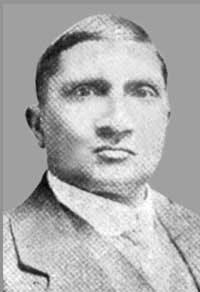|
During the inauguration of the exhibition on Gandhi in Tamil Nadu at the Roja Muthiah Research Library, A. Annamalai, Director, Gandhi Study Centre, spoke of the Tamils in South Africa, who helped Gandhi mould his views on the struggle for freedom, and made particular mention of four of them, Thambi Naidoo, V.A. Chettiar, Thillaiyadi Valliammai, and Selvan.

|
Govindaswamy Krishnaswamy Thambi Naidoo was one of the earliest collaborators with Gandhi, working with him from 1906 to 1914. The fact that Gandhi was able to weld together different societies who were fighting against the racial repression both by the local whites and the British, made him at once an acceptable leader. Thambi Naidoo and his wife Veerammal joined Gandhiji in his satyagraha. During the picketing of Registration Offices in July 1907, Thambi Naidoo was the first to be arrested. He was given 14 days’ imprisonment. On December 28th that year he was charged for refusing to register and sent out of Transvaal. When he refused to obey the orders, he along with Gandhiji was arrested on January 10, 1908 and sent to jail.
In 1913, when Gandhiji invited women to join the satyagraha, Veerammal was the first to respond to the call by Gandhi for women volunteers, even though she was in an advanced stage of pregnancy. Thambi Naidoo led the first batch of women from Johannesburg to Natal.
When Gandhi organised women satyagrahis, whom he called the sisters, they were, with one exception, all Tamils. They were: Mrs. Thambi Naidoo, Mrs. N. Pillay, Mrs. K. Murugasa Pillay, Mrs. A. Perumal Naidoo, Mrs. P.K. Naidoo, Mrs. K. Chinnaswami Pillay, Mrs. N.S. Pillay, Mrs. R.A. Mudalingam, Mrs. Bhavani Dayal, Miss Minachi Pillay and Miss Baikum Murugasa Pillay. The first meeting of Indian women at Hamidia Society Hall was addressed by Mrs. Thambi Naidoo, Mrs. Patel and Miss Schlesin. They then formed the Indian Women’s Association.
According to Gandhi, “Naidoo was a tremendous help in South Africa.” In February 1908, after the Smuts-Gandhi agreement, Gandhiji was severely assaulted by a Pathan who felt that the agreement was a betrayal. Thambi Naidoo went to Gandhi’s rescue and was also assaulted.
To Thambi Naidoo and Veerammal was born Narainswamy (Naran) who married Manonmoney (Amma) and together they carried on the struggle in the Gandhian way for two decades. This couple had five children and, inspired by their parents’ commitment, they too joined the movement against the racist government. The eldest daughter Shanthie was imprisoned and a son, Indres, was injured by a bullet in the struggle. Indres was also sentenced to 10 years’ imprisonment. His younger brother Murthie was twice jailed and thereafter lived under restrictions imposed by the Government. Rennie, the other daughter, was beaten badly by the police when she was barely nine! Even the youngest boy was not spared!
Mahatma Gandhi, writing in his Satyagraha in South Africa (original in Gujarati and translated by Valji Govind Desai), says, “I would like to introduce to the reader one out of the several leading Indians who constituted the first batch of prisoners, Shri Thambi Naidoo. Thambi Naidoo was a Tamilian born in Mauritius where his parents had migrated from Madras State. He was an ordinary trader. He had practically received no scholastic education whatever. But a wide experience had been his schoolmaster. He spoke and wrote English very well, although his grammar was not perhaps free from faults. In the same way, he had acquired a knowledge of Tamil. He understood and spoke Hindustani fairly well and he had some knowledge of Telugu too. He had a very keen intelligence and could grasp new subjects very quickly. His ever-ready wit was astonishing. He had never seen India. Yet his love for the homeland knew no bounds. Patriotism ran through his very veins... His firmness was pictured on his face. He was very strongly built and he possessed tireless energy. He shone equally whether he had to take the chair at meetings and lead them, or whether he had to do porter’s work. He would not be ashamed of carrying a load on the public roads. Night and day were the same to him when he has to work. And none was more ready than he to sacrifice his all for the sake of the community.”
Thambi Naidoo passed away in 1953.
|